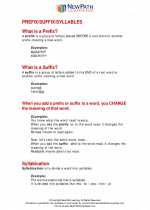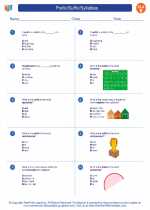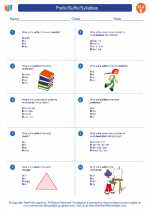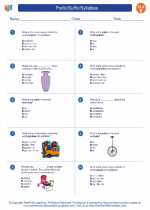Prefix/Suffix/Syllables
Understanding prefixes, suffixes, and syllables is important for decoding and understanding the meaning of words. Prefixes and suffixes are affixes, which are added to the beginning (prefix) or end (suffix) of a word to change its meaning. Syllables are the phonological building blocks of words. Learning about prefixes, suffixes, and syllables can help students improve their vocabulary and reading comprehension.
Prefixes
A prefix is a group of letters that are added to the beginning of a word to change its meaning. For example, the prefix "un-" added to the word "happy" changes the meaning to "unhappy." Common prefixes include "re-" (again), "dis-" (not), "pre-" (before), and "mis-" (wrong).
Suffixes
A suffix is a group of letters that are added to the end of a word to change its meaning. For example, the suffix "-less" added to the word "fear" changes the meaning to "fearless." Common suffixes include "-ing" (present participle), "-ed" (past tense), "-able" (capable of), and "-tion" (state or condition of).
Syllables
A syllable is a unit of pronunciation that contains a vowel sound. Understanding syllables can help with reading and spelling. For example, the word "elephant" has three syllables: "el-e-phant." Breaking words into syllables can help with pronunciation and decoding unfamiliar words.
Study Guide
- Define a prefix and provide three examples of words with prefixes.
- Define a suffix and provide three examples of words with suffixes.
- Identify the number of syllables in the following words: "basketball," "elephant," "computer," "fireplace."
- Create a list of 10 words and identify the prefixes, suffixes, and number of syllables in each word.
- Write a paragraph using at least five words with prefixes or suffixes.
Studying prefixes, suffixes, and syllables can help students become more proficient in reading, decoding, and understanding the meaning of words. Practice identifying and using prefixes, suffixes, and syllables to improve vocabulary and reading skills.
[Prefix/Suffix/Syllables] Related Worksheets and Study Guides:
.◂English Language Arts Worksheets and Study Guides Fifth Grade. Prefix/Suffix/Syllables

 Worksheet/Answer key
Worksheet/Answer key
 Worksheet/Answer key
Worksheet/Answer key
 Worksheet/Answer key
Worksheet/Answer key
